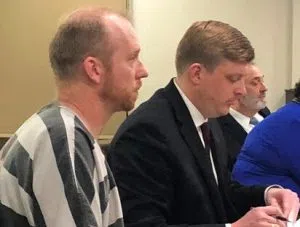
North Dakota’s Supreme Court has dismissed the appeal of the late Chad Isaak, the 47-year-old Washburn man convicted in the 2019 murders of four people in Mandan.
Isaak killed himself last year while in prison – after appealing his 2021 conviction.
The state argued the appeal is moot, while Isaak’s counsel said the case should either be dismissed because the judgment is not yet final — or the appeal should be decided on merits.
The High Court unanimously concluded that the appeal is moot…and the convictions stand.
In August 2021, a jury found Isaak guilty of killing RJR Maintenance and Management co-owner Robert Fakler and employees Adam Fuehrer, Bill Cobb, and his wife, Lois Cobb.
= =
(ND Supreme Court opinion:)
State v. Isaak
No. 20220031
McEvers, Justice.
[¶1] Chad Isaak died after appealing from a criminal judgment. His counsel
argues the case should either be dismissed because the judgment is not yet
final or the appeal should be decided on the merits. The State argues the appeal
is moot and the judgment should stand. No one has sought substitution on
Isaak’s behalf. The victims’ families have not asserted a constitutional right to
have the appeal proceed to disposition on the merits. The district court did not
order restitution or fees. Absent any of these occurrences, and with no other
apparent collateral consequences from a decision by this Court, we conclude
the appeal is moot and dismiss it. The judgment stands as issued by the district
court.
I
[¶2] After law enforcement investigated multiple killings that occurred in
Mandan, the State charged Isaak with burglary, unlawful entry, unauthorized
use of a motor vehicle, and four counts of murder. A jury found Isaak guilty on
all counts. The district court sentenced Isaak to life imprisonment without the
possibility of parole. The court waived all fees and did not order restitution.
Isaak appealed. He raised issues concerning voir dire, his right to a public trial,
and his right to be present during trial. He died before the State responded.
After learning of Isaak’s death, we stayed the appeal and instructed the
attorneys for each side to file supplemental briefing regarding mootness,
abatement, and victims’ rights. Because the case presents an issue of first
impression, we waived our procedural rule that ordinarily requires dismissal
after the death of a party absent a motion for substitution. See N.D.R.App.P.
43 (“If no action is taken to substitute the decedent’s personal representative
or other appropriate party, the appeal must be dismissed unless otherwise
ordered by the court.”).
2
II
[¶3] Isaak’s counsel asks us to apply the doctrine of abatement ab initio and
nullify his conviction because it is not final. His counsel alternatively argues
the appeal should be decided on the merits because it presents important
constitutional questions. The State asserts application of abatement ab initio
would be contrary to the constitutional rights of the victims and their families.
The State argues the appeal is moot, it should be dismissed, and the judgment
should stand.
A
[¶4] Abatement ab initio is a common law rule. Commonwealth v. Hernandez,
118 N.E.3d 107, 110 (Mass. 2019). “An abatement ab initio of a criminal
prosecution means a dismissal of all proceedings in the prosecution from its
inception.” People v. Peters, 517 N.W.2d 773, 775 (Mich. App. 1994). “That is,
the appeal does not just disappear, and the case is not merely dismissed.
Instead, everything associated with the case is extinguished, leaving the
defendant as if he had never been indicted or convicted[.]” Hernandez, at 110
(quoting United States v. Estate of Parsons, 367 F.3d 409, 413 (5th Cir. 2004)).
The rule is grounded on a theory that the purpose for criminal prosecution is
to punish guilty defendants, and “it is useless to continue such prosecutions
when the defendant is dead.” State v. Burrell, 837 N.W.2d 459, 464 (Minn.
2013). Another rationale is that appeals are integral to our system of justice
and defendants should not be labeled guilty until they have exhausted their
opportunity to appeal. People v. Griffin, 328 P.3d 91, 92-93 (Colo. 2014).
[¶5] No guiding precedent from the United States Supreme Court exists. In
Durham v. United States, 401 U.S. 481, 483 (1971), the Supreme Court abated
a conviction when a defendant died while his petition for certiorari was
pending. In Dove v. United States, 423 U.S. 325, 325 (1976), the Supreme Court
dismissed a petition that was pending when a defendant died. The Supreme
Court’s decision in Dove overruled Durham “[t]o the extent [it] may be
inconsistent.” Dove, at 325. Federal circuit courts of appeal have generally
applied the doctrine of abatement ab initio. See United States v. Christopher,
273 F.3d 294, 297 (3d Cir. 2001) (collecting cases); United States v. Coddington,
3
802 F. App’x 373, 374 n.2 (10th Cir. 2020). The federal cases are not persuasive
because the federal constitution does not provide victims of crime with rights
similar to the North Dakota Constitution. See N.D. Const. art. I, § 25.
[¶6] States that have addressed the issue have struggled with balancing a
deceased defendant’s right to appeal against the interests of crime victims. See
generally Burrell, 837 N.W.2d at 463-67 (collecting the approaches of various
jurisdictions). Some states abate the conviction entirely. See, e.g., People v.
Robinson, 719 N.E.2d 662, 664 (Ill. 1999) (“a defendant’s conviction abates ab
initio if defendant dies while his direct appeal is pending”). Other states
dismiss the appeal and allow the conviction to stand. See, e.g., State v. Korsen,
111 P.3d 130, 135 (Idaho 2005) (“we hold that a criminal conviction and any
attendant order requiring payment of court costs and fees, restitution or other
sums to the victim, or other similar charges, are not abated, but remain
intact”). Various states fall somewhere in the middle. See, e.g., People v. Peters,
537 N.W.2d 160, 161 (Mich. 1995) (appeal should be dismissed and conviction
should stand absent collateral consequences; purely penal sanctions should be
abated ab initio); State v. Carlin, 249 P.3d 752, 754 (Alaska 2011) (“defendant’s
conviction will stand unless the defendant’s personal representative elects to
continue the appeal”); State v. Hollister, 329 P.3d 1220, 1226-27 (Kan. 2014)
(courts should only address certain types of issues raised by the decedent);
State v. Reed, 456 P.3d 453, 461-62 (Ariz. 2020) (mixing approaches from
different jurisdictions); see also Hernandez, 118 N.E.3d at 114-15 nn.12-15
(collecting cases from various jurisdictions). States appear to be trending away
from applying abatement ab initio due, in part, to contemporary recognition of
victims’ rights. See State v. Al Mutory, 581 S.W.3d 741, 748 (Tenn. 2019); see
also 7 Wayne R. LaFave et al., Criminal Procedure § 27.5(a) (4th ed. 2015).
B
[¶7] Whether to apply the doctrine of abatement ab initio is a question of first
impression in North Dakota. The closest we have come to addressing the issue
is State v. Dalman, 520 N.W.2d 860 (N.D. 1994). Dalman moved for postconviction relief seeking to withdraw a guilty plea. Id. at 861. His application
was denied, and he died after appealing. Id. at 861-62. This Court held his
4
death mooted the appeal. Id. at 862. Justice Levine concurred explaining she
would have abated the conviction if the case was a direct appeal because “when
an appeal has been taken from a conviction, and death has deprived the
accused of her right to appellate review, the defendant should not stand
convicted without resolution of her appeal.” Id. at 865. However, unlike
Dalman, Isaak’s case is a direct appeal challenging the validity of his
convictions. Isaak’s statutory right to appeal has not expired by a lapse of time.
See N.D.C.C. § 29-28-03 (criminal appeals may be taken as a matter of right).
We thus do not read Dalman to bind us to any specific approach.
[¶8] Since Dalman, North Dakota adopted N.D. Const. art I, § 25, which
provides various rights to crime victims. Section 25(1)(n) guarantees victims
the “right to full and timely restitution in every case.” Section 25(1)(o)
specifically provides crime victims the right “to a prompt and final conclusion
of the case and any related post-judgment proceedings.” See also N.D.C.C. §
12.1-34-02(13) (victims are entitled to prompt disposition of criminal cases).
Under N.D. Const. art. I, § 25(1)(q), victims have the right to be heard in
criminal proceedings and to participate in “all post-judgment processes and
procedures.” Section 25(2) specifically allows a victim, a victim’s
representative, or the State to “assert and seek enforcement of the rights
enumerated in this section.”
[¶9] We conclude the common law doctrine of abatement ab initio is
inconsistent with N.D. Const. art. I, § 25. Although a criminal defendant may
have enjoyed a statutory right to appeal before his death, deceased individuals’
statutory rights cannot prevail over the constitutional rights of the living.
Abatement of criminal convictions would foreclose victims’ rights to fair
treatment under the law and to meaningfully participate in the criminal justice
system. See N.D. Const. art. I, § 25(1) (victims’ rights must be “respected and
protected by law in a manner no less vigorous than the protections afforded to
criminal defendants”); see also State v. Devin, 142 P.3d 599, 605-06 (Wash.
2006) (abatement ab initio is inconsistent with victims’ rights to restitution
and a constitutional provision requiring victims receive “due dignity and
respect”); Korsen, 111 P.3d at 135 (criminal conviction held not abated by virtue
5
of victims’ constitutional rights provisions). We therefore decline to adopt the
doctrine of abatement ab initio.
C
[¶10] We are left to decide whether there is an actual controversy before us.
See Somerset Court, LLC v. Burgum, 2021 ND 58, ¶ 9, 956 N.W.2d 392 (we do
not give advisory opinions on abstract legal questions). When there is no
controversy to be decided, appeals will be dismissed as moot. State v. Hansen,
2006 ND 139, ¶ 7, 717 N.W.2d 541. “An actual controversy does not exist when
due to the lapse of time or the occurrence of related events prior to the appellate
court’s determination, the appellate court is unable to render effective relief.”
Id. An appeal is not moot, however, if the decision would have collateral
consequences. State v. Oshiro, 2022 ND 95, ¶ 6, 974 N.W.2d 365; see also State
v. Olson, 2003 ND 23, ¶ 9, 656 N.W.2d 650.
[¶11] We have analyzed whether a living defendant will suffer collateral
consequences when deciding questions of mootness in criminal cases. See, e.g.,
Oshiro, 2022 ND 95, ¶ 9 (whether release from custody mooted appeal); Olson,
2003 ND 23, ¶ 9 (whether subsequent criminal conviction mooted appeal from
probation revocation proceeding). We have never addressed collateral
consequences in the context of a criminal defendant’s death before disposition
of a direct appeal. Other jurisdictions have recognized financial consequences
to a defendant’s estate and the interests of victims are sufficient to present an
actual controversy when a defendant dies before disposition of his or her
appeal. See, e.g., Hernandez, 118 N.E.3d at 120 (discussing “the potential
impact abatement ab initio can have on collateral matters, including
undermining issue preclusion”); Carlin, 249 P.3d at 764 (discussing financial
consequences to defendants’ estates and the interests of victims “in
condemning the offender”); State v. McDonald, 424 N.W.2d 411, 414 (Wis. 1988)
(discussing collateral issues incident to murder cases).
[¶12] Isaak’s conviction did not result in an order for restitution and all the
criminal fees were waived. Isaak’s personal representative has not requested
to serve as substitute. See N.D.R.App.P. 43; see also N.D.C.C. § 30.1-18-03(3).
We are not aware of any wrongful death suits or claims against Isaak’s estate
6
implicating preclusion questions. None of the victims’ families in this case have
asserted a right or interest in having us decide the merits of the appeal. Any
solace the guilty verdict provides them could disappear if we reversed the
judgment on legal issues. See State v. Garland, 694 A.2d 564, 569 (N.J. 1997)
(when a decedent’s conviction is reversed he cannot be retried and “the victims
of the crime cannot win”). In a future case, there may be circumstances
requiring this Court decide the merits of an appeal after a defendant’s death.
None are present here. Isaak is no longer alive to serve his sentence if we were
to affirm the judgment. If we were to reverse the judgment, we could not grant
Isaak the new trial he sought. Under these circumstances, a decision would be
advisory.
III
[¶13] We dismiss the appeal as moot. The judgment stands as issued by the
district court.
[¶14] Jon J. Jensen, C.J.
Lisa Fair McEvers
Jerod E. Tufte
Douglas A. Bahr
Douglas L. Mattson, D.J.
[¶15] The Honorable Douglas L. Mattson, D.J., sitting in place of Crothers, J.,
disqualified.










